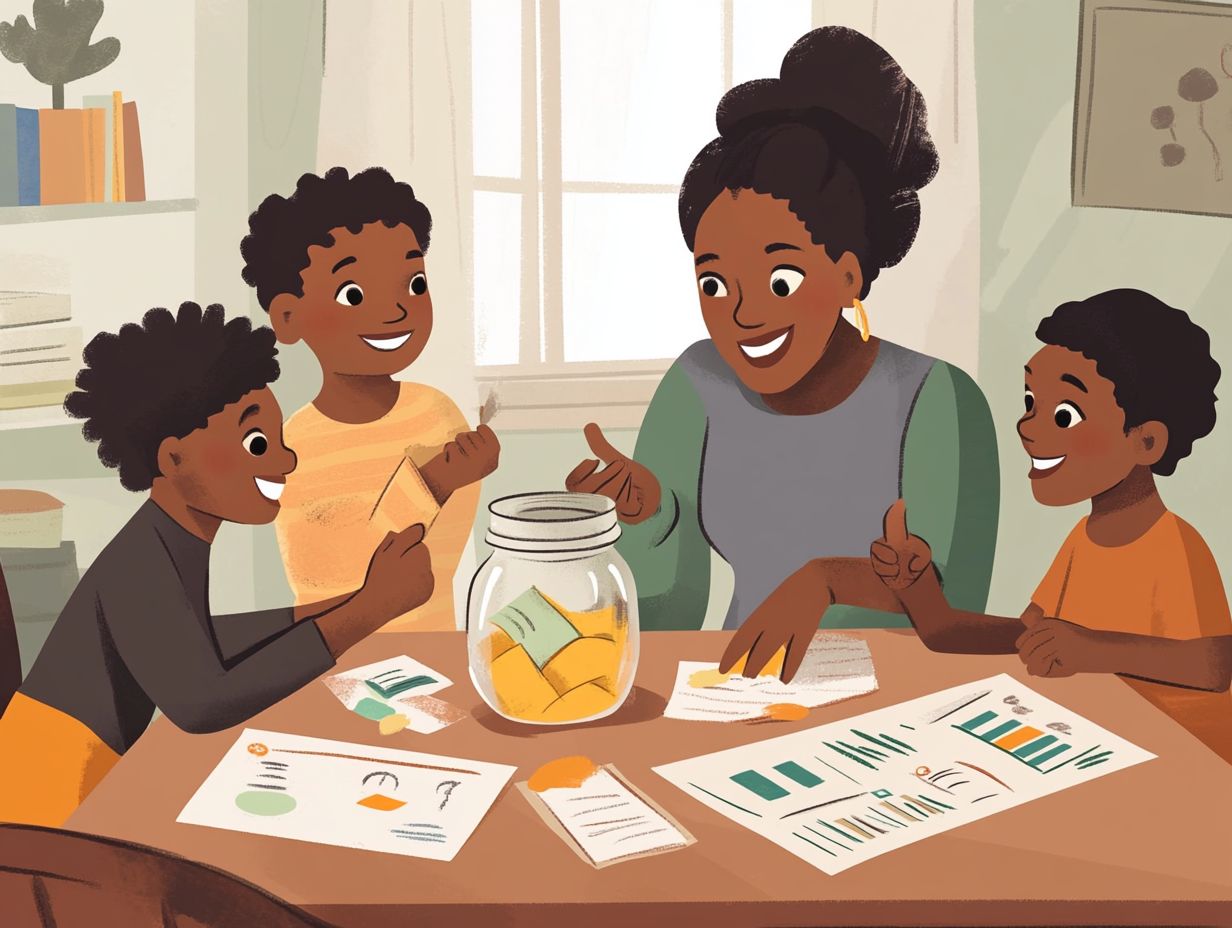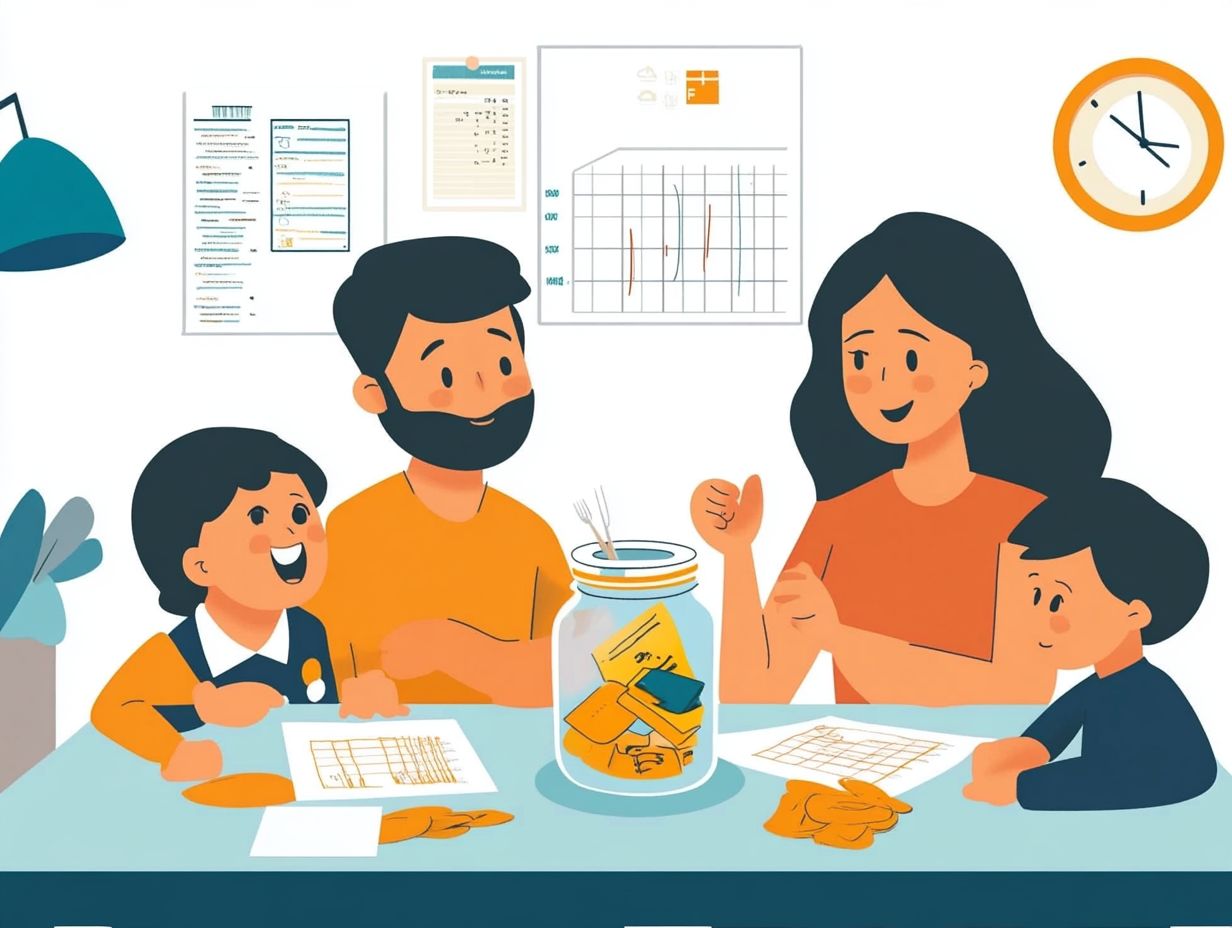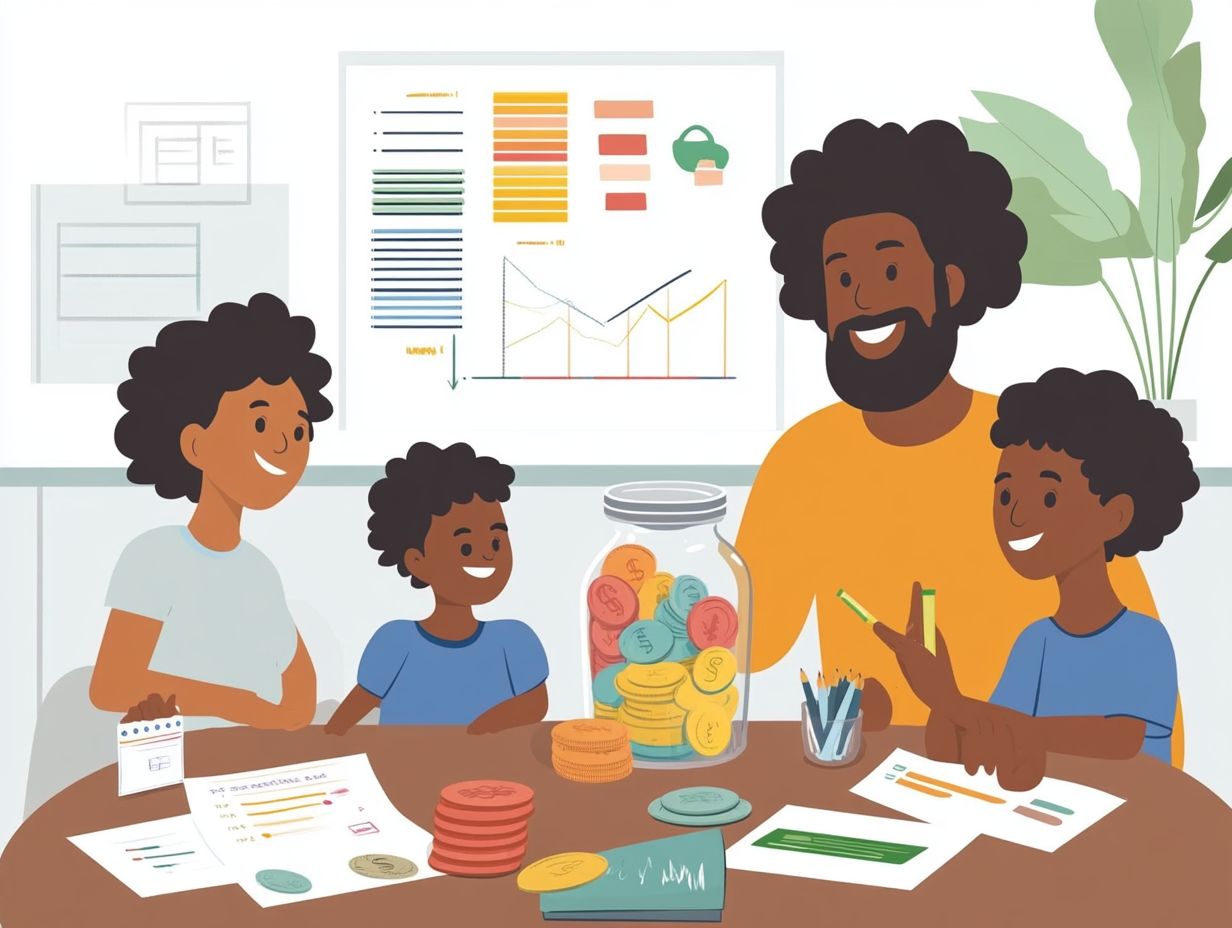How Can I Teach My Kids About Budgeting?
Teaching your kids about budgeting is an essential life skill that lays the groundwork for their future financial success. By helping them understand the value of money and how to manage it wisely, you enable them to cultivate habits that pave the way to financial independence.
This article delves into the ideal moments and methods for introducing budgeting concepts to children, offering practical activities and tech-based tools to transform learning into an enjoyable experience. It also highlights pitfalls to avoid, ensuring the lessons remain engaging and effective.
As you navigate these topics, discover how you can empower your children with the knowledge and skills they need to flourish financially!
Contents
- Key Takeaways:
- The Importance of Teaching Kids About Budgeting
- When to Start Teaching Kids About Budgeting
- Practical Ways to Teach Kids About Budgeting
- Setting a Good Example
- Common Mistakes to Avoid When Teaching Kids About Budgeting
- Reinforcing Lessons and Encouraging Good Habits
- Frequently Asked Questions
- How Can I Teach My Kids About Budgeting?
- Why is it important to teach my kids about budgeting?
- At what age should I start teaching my kids about budgeting?
- How can I make budgeting fun for my kids?
- What are some practical ways to teach budgeting to my kids?
- How can I lead by example when it comes to budgeting?
Key Takeaways:

- Start teaching kids about budgeting at a young age; it sets them up for future financial success.
- Use hands-on exercises and technology/games to make budgeting fun and engaging for kids.
- Parents should model good financial habits and reinforce lessons to encourage positive budgeting habits in their children.
The Importance of Teaching Kids About Budgeting
Teaching kids about budgeting is essential for their long-term success. It instills the principles of understanding money and equips them with crucial money management skills that will shape their financial behaviors as adults.
By grasping the importance of budgeting, your children will learn the value of saving money in a clear jar, the concept of what they give up when they choose one option over another, and the critical distinction between wants and needs. This early education fosters financial responsibility, ensuring they make informed money decisions throughout their lives.
Benefits for Future Financial Success
Teaching kids how to budget sets them up for a bright financial future! It equips them to navigate the complexities of earning money, spending wisely, and building savings for college while avoiding the pitfalls of student loan debt.
By instilling these practices early on, you help children grasp the importance of setting financial goals. This motivation can inspire them to save for their desires, whether it s a shiny new bike or the latest video game.
Engaging in hands-on activities, like creating a weekly spending plan or using an allowance tracker, not only makes budgeting enjoyable but also reinforces the crucial distinction between needs and wants. These exercises allow kids to visualize their progress and develop a sense of responsibility toward their finances.
In the long run, these skills can lead to more stable financial lives as they transition into adulthood.
When to Start Teaching Kids About Budgeting
Teaching kids about budgeting early is essential. Understanding money is a lifelong skill that can profoundly influence their future.
By introducing age-appropriate lessons, you can help them grasp fundamental concepts like saving, spending, and distinguishing between needs and wants from a young age. This foundation will serve them well as they navigate their financial journeys.
Age-Appropriate Lessons and Activities
Age-appropriate lessons and activities for teaching kids about financial education can vary widely. Start with simple saving tasks using a clear savings jar for little ones, and progress to more intricate budgeting strategies for older children gearing up for college.
Your toddlers can begin grasping the value of coins with a piggy bank. As they transition to elementary school, encourage hands-on activities like running a lemonade stand, where they ll learn to calculate costs and profits. Once they hit middle school, consider introducing concepts like commissions through pretend jobs where they earn rewards for completing household chores to deepen their understanding of money management.
When they reach their teenage years, they re primed for budgeting exercises using apps or spreadsheets, allowing them to plan budgets that incorporate savings accounts and future educational expenses. These varied approaches not only cater to different developmental stages but also make the learning experience engaging and relatable!
Start teaching them today and equip your kids with the tools they need for financial success!
Practical Ways to Teach Kids About Budgeting

Teaching kids about budgeting involves hands-on activities that let them experience money management firsthand. Use fun budgeting apps to make learning enjoyable and involve them in real-life financial decisions.
These methods not only boost their understanding of money skills but also build a sense of responsibility in managing their finances.
Hands-On Budgeting Exercises
Hands-on budgeting exercises are a fantastic way to teach financial responsibility. Engage kids in activities that encourage tracking expenses, distinguishing needs from wants, and understanding the consequences of impulse buying.
For instance, creating a mock grocery shopping list allows kids to prioritize their desires by comparing prices and evaluating their budgets before making purchases.
Using apps designed for budgeting can provide an interactive platform that tracks spending in real-time while offering insights into saving habits.
These examples not only make learning fun but also cultivate critical thinking and decision-making skills. By navigating financial scenarios, children will appreciate the importance of planning and see how their choices affect their futures.
Using Technology and Games
Utilizing technology and games to teach budgeting creates an engaging environment for learning about money. Budgeting apps help kids visualize savings and track their financial goals easily.
Apps like ‘Greenlight’ and ‘GoHenry’ allow kids to manage their allowances, providing insights into their spending with real-time notifications. These platforms inspire them to set specific financial goals and discuss prioritizing wants versus needs.
Games like ‘Monopoly’ or ‘The Game of Life’ seamlessly integrate budgeting principles into play, showing kids the effects of financial decisions in a risk-free setting. By using these tools, you can instill a sense of responsibility and awareness about budgeting from an early age, setting them up for a bright financial future.
Setting a Good Example
Setting a strong example in financial habits is crucial for parents, as children often mirror their behaviors. Your guidance can foster a healthy approach to money management and highlight the significance of responsible financial choices.
The Role of Parents in Modeling Good Financial Habits
Parents are crucial in modeling sound financial habits, teaching budgeting principles, and demonstrating how to make smart money decisions. This builds a strong foundation for their future!
By discussing money management openly, parents can clarify financial concepts, making topics like saving, spending, and investing feel approachable. Sharing personal budgeting strategies like tracking expenses or setting savings goals gives kids a practical lens to observe these principles in action.
Involving children in household budgeting tasks, such as grocery planning or allocating funds for family outings, equips them with hands-on experience. This reinforces the importance of mindful spending and helps them confidently navigate their financial futures.
Common Mistakes to Avoid When Teaching Kids About Budgeting

When teaching kids about budgeting, avoid common pitfalls that can dampen their interest and understanding. Overloading them with complex concepts or presenting lessons in a boring way can stifle their enthusiasm.
Instead, focus on creating engaging, relatable experiences that capture their attention and foster a genuine understanding of budgeting.
Start teaching your kids about budgeting today! With your guidance, they can learn valuable financial skills that will help them throughout their lives.
How to Avoid Overwhelming or Boring Lessons
To ensure your lessons don t overwhelm or bore your students, it s vital to weave in engaging activities that resonate with them. For instance, consider using visual savings methods methods that allow students to see their progress, like a clear jar to illustrate the concept of saving money.
Games elevate the learning experience, turning financial concepts into interactive and enjoyable activities. Imagine introducing a budgeting game that helps students understand the importance of tracking their expenses in a fun way.
By providing relatable examples from everyday life, such as favorite snacks or toys, you can make your lessons feel more accessible. Practical budgeting exercises, where students plan a fictional event or manage a hypothetical allowance, further reinforce these concepts.
These strategies capture attention and spark excitement for managing finances, cultivating a sense of ownership and responsibility.
Reinforcing Lessons and Encouraging Good Habits
Reinforcing lessons and fostering good habits are essential components in teaching kids about budgeting. Using praise and rewards greatly enhances their financial skills and strengthens their commitment to responsible money management.
Ways to Encourage and Reward Good Budgeting Habits
Encouraging and rewarding good budgeting habits can be achieved by setting specific financial goals and offering enticing incentives for saving.
By introducing an engaging rewards system, you can transform the budgeting process into an exciting challenge rather than a mundane task. For example, a point system that awards points for reaching savings milestones can cultivate a sense of achievement. Pairing these points with privileges, such as extra screen time or a fun outing, reinforces positive behavior and makes saving feel rewarding.
Utilizing age-appropriate tools, like a savings jar that visually tracks their progress, can deepen their understanding. Ultimately, these practical strategies spark enthusiasm for budgeting and lay a solid foundation for effective money management as they mature.
Frequently Asked Questions
-
How Can I Teach My Kids About Budgeting?
Teaching kids about budgeting can be daunting, but it’s an important life skill that will benefit them in the long run. To enhance their financial education, consider including how to teach children about debt management. Here are some tips to help you get started.
-
Why is it important to teach my kids about budgeting?
Teaching kids about budgeting helps them understand the value of money and prepares them for managing their own finances in the future.
-
At what age should I start teaching my kids about budgeting?
It’s never too early to start teaching kids about budgeting. The earlier you start, the better they will understand and develop good financial habits.
-
How can I make budgeting fun for my kids?
Budgeting doesn’t have to be boring! You can make it fun by turning it into a game or challenge, such as having your child create a budget for their weekly allowance.
-
What are some practical ways to teach budgeting to my kids?
Involve your kids in family financial discussions. You can give them an allowance and let them make their own spending decisions.
-
How can I lead by example when it comes to budgeting?
Kids learn best by observing their parents. Practice good budgeting habits, involve your kids in family budget discussions, and explain the importance of budgeting in your life.
Share your budgeting tips with us in the comments!







